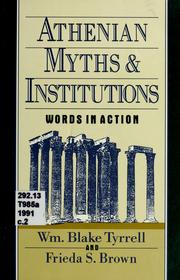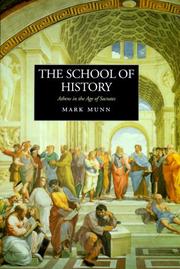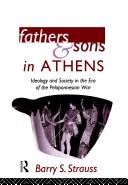| Listing 1 - 10 of 31 | << page >> |
Sort by
|

ISBN: 1280440724 0198023162 1423736958 1601298005 9781423736950 9781601298003 9781280440724 9786610440726 6610440727 0195067185 0195067193 9780195067187 9780195067194 0197704301 Year: 1991 Publisher: New York : Oxford University Press,
Abstract | Keywords | Export | Availability | Bookmark
 Loading...
Loading...Choose an application
- Reference Manager
- EndNote
- RefWorks (Direct export to RefWorks)
This book analyzes the relationships between Athenian myths and the institutions that informed them. In particular, it examines how myths encode thoughts on ritual, the code of the warrior, marriage, and politics. Combining traditional historical and literary criticism with the approaches of anthropologists, feminist critics, and cultural historians, the authors study specific examples of the epic and tragedy, as well as funeral orations and the Parthenon marbles, to illuminate the ways mythic media exploited the beliefs, concepts, and practices of fifth-century Athens, simultaneously exemplif
Mythology, Greek. --- Greek mythology --- Athens (Greece) --- Aḟiny (Greece) --- Atene (Greece) --- Atʻēnkʻ (Greece) --- Ateny (Greece) --- Athen (Greece) --- Athēna (Greece) --- Athēnai (Greece) --- Athènes (Greece) --- Athinai (Greece) --- Athīnā (Greece) --- Αθήνα (Greece) --- Religion. --- Civilization.

ISBN: 1135888604 9786610232062 1280232064 0203335104 9780203335109 9780415966092 0415966094 9780415966108 0415966108 0415966094 0415966108 6610232067 9781280232060 9781135888602 9781135888558 9781135888596 1135888590 Year: 2004 Publisher: New York London Routledge
Abstract | Keywords | Export | Availability | Bookmark
 Loading...
Loading...Choose an application
- Reference Manager
- EndNote
- RefWorks (Direct export to RefWorks)
Focusing on the works of three of the greatest orators in history-Demosthenes, Lysias, and Hypereides-this collection of speeches is an indispensable source for anyone interested in classical civilization and literature, political science and rhetoric
Athens (Greece) --- Aḟiny (Greece) --- Atene (Greece) --- Atʻēnkʻ (Greece) --- Ateny (Greece) --- Athen (Greece) --- Athēna (Greece) --- Athēnai (Greece) --- Athènes (Greece) --- Athinai (Greece) --- Athīnā (Greece) --- Αθήνα (Greece) --- History --- Sources
Book
ISBN: 178570530X 1785705326 9781785705328 9781785705298 9781785705304 Year: 2016 Publisher: Oxford
Abstract | Keywords | Export | Availability | Bookmark
 Loading...
Loading...Choose an application
- Reference Manager
- EndNote
- RefWorks (Direct export to RefWorks)
Athens (Greece) --- Macedonia --- Aḟiny (Greece) --- Atene (Greece) --- Atʻēnkʻ (Greece) --- Ateny (Greece) --- Athen (Greece) --- Athēna (Greece) --- Athēnai (Greece) --- Athènes (Greece) --- Athinai (Greece) --- Athīnā (Greece) --- Αθήνα (Greece) --- Macedon --- Makedhonia --- Makedonia --- Makedoniya --- Makedonja --- History
Book
ISBN: 0299151131 9780299151133 Year: 1996 Publisher: Madison, Wisconsin : The University of Wisconsin Press,
Abstract | Keywords | Export | Availability | Bookmark
 Loading...
Loading...Choose an application
- Reference Manager
- EndNote
- RefWorks (Direct export to RefWorks)
Athens (Greece) --- Aḟiny (Greece) --- Atene (Greece) --- Atʻēnkʻ (Greece) --- Ateny (Greece) --- Athen (Greece) --- Athēna (Greece) --- Athēnai (Greece) --- Athènes (Greece) --- Athinai (Greece) --- Athīnā (Greece) --- Αθήνα (Greece) --- Religious life and customs. --- Parthenon (Athens, Greece) --- Frieze.
Book
ISBN: 0691055300 1306986443 0691605742 069163467X 1400859751 9781400859757 9780691055305 9780691605746 Year: 2014 Publisher: Princeton, NJ
Abstract | Keywords | Export | Availability | Bookmark
 Loading...
Loading...Choose an application
- Reference Manager
- EndNote
- RefWorks (Direct export to RefWorks)
Glenn Bugh provides a comprehensive discussion of a subject that has not been treated in full since the last century: the history of the Athenian cavalry. Integrated into a narrative history of the cavalry from the Archaic period through the Hellenistic age is a detailed analysis of a military and social organization the members of which came predominantly from the upper classes of Athens. Bugh demonstrates that this organization was not merely a military institution but an aristocratic social class with political expectations and fluctuating loyalties to the Athenian democracy.The last major work devoted exclusively to the subject appeared in French in 1886 and predated the publication of Aristotle's Constitution of the Athenians, which provides valuable information not only on the administration of the Athenian cavalry but also on the democracy that financed it. Furthermore, since the 1930s the American excavations of the Athenian marketplace and the German excavations of the ancient cemetery have yielded unparalleled epigraphical evidence pertaining to the Athenian cavalry, particularly in the areas of personnel and administration.Originally published in 1988.The Princeton Legacy Library uses the latest print-on-demand technology to again make available previously out-of-print books from the distinguished backlist of Princeton University Press. These editions preserve the original texts of these important books while presenting them in durable paperback and hardcover editions. The goal of the Princeton Legacy Library is to vastly increase access to the rich scholarly heritage found in the thousands of books published by Princeton University Press since its founding in 1905.
Cavalry --- History. --- -Armies --- History --- Athens (Greece) --- -History, Military --- -History --- History, Military. --- Aḟiny (Greece) --- Atene (Greece) --- Atʻēnkʻ (Greece) --- Ateny (Greece) --- Athen (Greece) --- Athēna (Greece) --- Athēnai (Greece) --- Athènes (Greece) --- Athinai (Greece) --- Athīnā (Greece) --- Armies --- Greece --- History [Military ] --- Αθήνα (Greece) --- Cavalry - Greece - Athens - History.
Book
ISBN: 9780521765930 0521765935 9780511642326 9781107415409 9780511641794 0511641796 0511642326 051163935X 9780511639357 0511700245 9780511700248 1107208831 9781107208834 1107415403 9786612386640 6612386649 0511638280 9780511638282 0511640439 9780511640438 Year: 2010 Publisher: Cambridge New York Cambridge University Press
Abstract | Keywords | Export | Availability | Bookmark
 Loading...
Loading...Choose an application
- Reference Manager
- EndNote
- RefWorks (Direct export to RefWorks)
Thucydides, Pericles, and the Idea of Athens in the Peloponnesian War is the first comprehensive study of Thucydides' presentation of Pericles' radical redefinition of the city of Athens during the Peloponnesian War. Martha Taylor argues that Thucydides subtly critiques Pericles' vision of Athens as a city divorced from the territory of Attica and focused, instead, on the sea and the empire. Thucydides shows that Pericles' reconceputalization of the city led the Athenians both to Melos and to Sicily. Toward the end of his work, Thucydides demonstrates that flexible thinking about the city exacerbated the Athenians' civil war. Providing a thorough critique and analysis of Thucydides' neglected book 8, Taylor shows that Thucydides praises political compromise centered around the traditional city in Attica. In doing so, he implicitly censures both Pericles and the Athenian imperial project itself.
City and town life --- Historiography. --- History. --- Thucydides. --- Pericles, --- Athens (Greece) --- Greece --- Politics and government. --- History --- Politics and government --- Historiography --- City life --- Town life --- Urban life --- Sociology, Urban --- Pericle, --- Perikl, --- Perikles, --- Perykles, --- Aḟiny (Greece) --- Atene (Greece) --- Atʻēnkʻ (Greece) --- Ateny (Greece) --- Athen (Greece) --- Athēna (Greece) --- Athēnai (Greece) --- Athènes (Greece) --- Athinai (Greece) --- Athīnā (Greece) --- Αθήνα (Greece) --- Arts and Humanities

ISBN: 0520929713 1597348880 9780520929715 0585391165 9780585391168 0520215575 9780520215573 9781597348881 Year: 2000 Publisher: Berkeley Los Angeles London University of California Press
Abstract | Keywords | Export | Availability | Bookmark
 Loading...
Loading...Choose an application
- Reference Manager
- EndNote
- RefWorks (Direct export to RefWorks)
History, political philosophy, and constitutional law were born in Athens in the space of a single generation--the generation that lived through the Peloponnesian War (431-404 b.c.e.). This remarkable age produced such luminaries as Socrates, Herodotus, Thucydides, Sophocles, Euripides, Aristophanes, and the sophists, and set the stage for the education and early careers of Plato and Xenophon, among others.
Democracy --- Self-government --- Political science --- Equality --- Representative government and representation --- Republics --- Historiography. --- Athens (Greece) --- Greece --- Aḟiny (Greece) --- Atene (Greece) --- Atʻēnkʻ (Greece) --- Ateny (Greece) --- Athen (Greece) --- Athēna (Greece) --- Athēnai (Greece) --- Athènes (Greece) --- Athinai (Greece) --- Athīnā (Greece) --- Αθήνα (Greece) --- Civilization --- Political aspects. --- History
Book
ISBN: 9780521191043 0521191041 9780511676024 9781107633995 1107204038 9781107204034 0511739338 9780511739330 1282525786 9781282525788 9786612525780 6612525789 0511678029 9780511678028 0511681259 9780511681257 0511683235 9780511683237 0511676026 0511679270 9780511679278 051167676X 1107633990 Year: 2010 Publisher: Cambridge Cambridge University Press
Abstract | Keywords | Export | Availability | Bookmark
 Loading...
Loading...Choose an application
- Reference Manager
- EndNote
- RefWorks (Direct export to RefWorks)
In Race and Citizen Identity in the Classical Athenian Democracy, Susan Lape demonstrates how a race ideology grounded citizen identity. Although this ideology did not manifest itself in a fully developed race myth, its study offers insight into the causes and conditions that can give rise to race and racisms in both modern and pre-modern cultures. In the Athenian context, racial citizenship emerged because it both defined and justified those who were entitled to share in the political, symbolic, and socioeconomic goods of Athenian citizenship. By investigating Athenian law, drama, and citizenship practices, this study shows how citizen identity worked in practice to consolidate national unity and to account for past Athenian achievements. It also considers how Athenian identity narratives fuelled Herodotus' and Thucydides' understanding of history and causation.
History of ancient Greece --- Athens --- Democracy --- Démocratie --- History --- Histoire --- Démocratie --- Citizenship --- Birthright citizenship --- Citizenship (International law) --- National citizenship --- Nationality (Citizenship) --- Political science --- Public law --- Allegiance --- Civics --- Domicile --- Political rights --- Law and legislation --- Athens (Greece) --- Aḟiny (Greece) --- Atene (Greece) --- Atʻēnkʻ (Greece) --- Ateny (Greece) --- Athen (Greece) --- Athēna (Greece) --- Athēnai (Greece) --- Athènes (Greece) --- Athinai (Greece) --- Athīnā (Greece) --- Race relations --- History. --- Αθήνα (Greece) --- Arts and Humanities

ISBN: 0415041465 041562021X 9786610331260 1134952465 1280331267 0203034910 9780203034910 0203324765 1134952457 0691015910 Year: 1993 Publisher: London Routledge
Abstract | Keywords | Export | Availability | Bookmark
 Loading...
Loading...Choose an application
- Reference Manager
- EndNote
- RefWorks (Direct export to RefWorks)
As history's first democracy, classical Athens invited political discourse. The Athenians, however could not completely separate the politicals from the private sphere; indeed father-son conflict, from patricide to murdering one's son, was a major public as well as a private theme. In a fascinating historical reappraisal, the author explores the consequences, for Athens and us, of the powerful influence of familial ideology on politics.
Fathers and sons --- Athens (Greece) --- History --- Family --- Greek literature --- Literature and society --- Fathers and sons in literature. --- History and criticism. --- History. --- Greece --- In literature. --- Literature --- Literature and sociology --- Society and literature --- Sociology and literature --- Sociolinguistics --- Sons and fathers --- Father and child --- Sons --- Social aspects --- Aḟiny (Greece) --- Atene (Greece) --- Atʻēnkʻ (Greece) --- Ateny (Greece) --- Athen (Greece) --- Athēna (Greece) --- Athēnai (Greece) --- Athènes (Greece) --- Athinai (Greece) --- Athīnā (Greece) --- Αθήνα (Greece)
Book
ISBN: 9781107030534 1107030536 9781139343817 1139611062 1107237556 1139625942 1139609270 1139616641 1139343815 1139612921 1139622226 1299405711 9781139625944 9781139612920 9781139611060 9781107237551 9781139609272 9781139616645 9781299405714 9781139622226 Year: 2013 Publisher: Cambridge Cambridge University Press
Abstract | Keywords | Export | Availability | Bookmark
 Loading...
Loading...Choose an application
- Reference Manager
- EndNote
- RefWorks (Direct export to RefWorks)
From the mid-sixth to the mid-fourth century BCE a nexus of connections to Thrace defined the careers of several of Athens' most prominent figures, including Pisistratus, Miltiades, Alcibiades and Iphicrates. This book explores the importance of Thrace to these individuals and its resulting significance in the political, cultural and social history of Athens. Thrace was vitally important for Athens thanks to its natural resources and access to strategic waterways, which were essential to a maritime empire, and connections to the area conferred wealth and military influence on certain Athenians and offered them a refuge if they faced political persecution at home. However, Thrace's importance to prominent individuals transcended politics: its culture was also an important draw. Thrace was a world free of Athenian political, social and cultural constraints - one that bore a striking resemblance to the world of Homeric epic.
Athens (Greece) --- Thrace --- Athènes (Grèce) --- Politics and government. --- Relations --- Politique et gouvernement --- Political science. --- Relations. --- Greece --- Mediterranean Region --- Athènes (Grèce) --- Arts and Humanities --- History --- Тракия --- Trakii︠a︡ --- Trakya --- Thrakien --- Thracia --- Tracia --- Thrakē --- Thráki --- Trakiya --- Θράκη --- Aḟiny (Greece) --- Atene (Greece) --- Atʻēnkʻ (Greece) --- Ateny (Greece) --- Athen (Greece) --- Athēna (Greece) --- Athēnai (Greece) --- Athènes (Greece) --- Athinai (Greece) --- Athīnā (Greece) --- Αθήνα (Greece)
| Listing 1 - 10 of 31 | << page >> |
Sort by
|

 Search
Search Feedback
Feedback About UniCat
About UniCat  Help
Help News
News